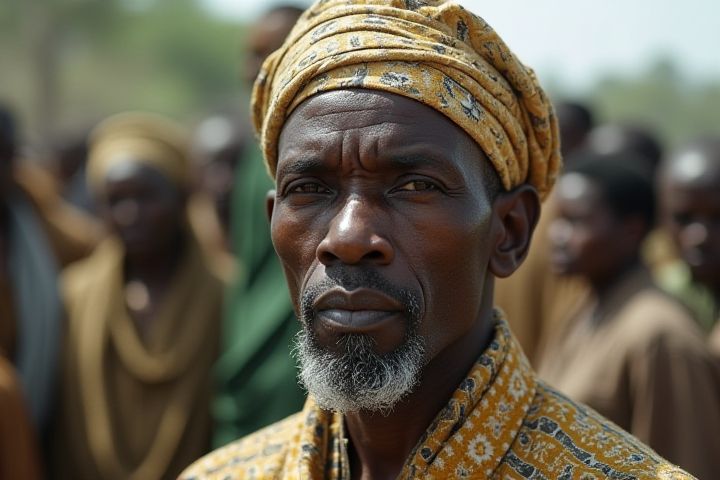
Nigeria is one of the most populous countries in Africa, with an estimated population exceeding 200 million people. This growing population presents challenges such as strain on infrastructure, education systems, and healthcare services. Urban areas like Lagos experience significant overcrowding, leading to traffic congestion and inadequate housing. High population density also exacerbates issues like unemployment and poverty, making resource allocation more difficult. Evaluating Nigeria's population trends is essential for planning sustainable development and improving quality of life for its citizens.
Rapid population growth
Nigeria's rapid population growth poses significant challenges, as the population is projected to exceed 400 million by 2050, making it one of the most populous countries in the world. This surge is fueled by a high fertility rate, which averages about 5.3 children per woman, alongside improved healthcare that reduces mortality rates. Urban areas are particularly affected, with cities like Lagos experiencing overwhelming migration and strain on infrastructure, sanitation, and resources. If not managed effectively, this growth could exacerbate issues such as unemployment, education deficits, and environmental degradation, impacting daily life for millions.
High population density
Nigeria is one of the most densely populated countries in Africa, with a population density exceeding 200 people per square kilometer in urban areas. This high population density has led to significant challenges, including inadequate infrastructure, strained healthcare services, and increased competition for resources such as housing, food, and clean water. Major cities like Lagos and Kano serve as economic hubs, further attracting migrants from rural regions and exacerbating urban congestion. You may find that addressing these issues requires comprehensive strategies focusing on sustainable development and effective urban planning to improve living conditions for the growing populace.
Strain on infrastructure
Nigeria, with a population exceeding 200 million, experiences significant strain on its infrastructure, including transportation, healthcare, and education systems. Rapid urbanization in cities like Lagos and Abuja has led to overcrowded roads, insufficient public transportation, and inadequate housing, exacerbating traffic congestion and commuting challenges. The healthcare system struggles to cope with the increasing demand for services, resulting in long wait times and limited access to quality care for many citizens. This overwhelming population pressure on infrastructure not only hampers economic growth but also contributes to social issues such as unemployment and insecurity.
Urbanization challenges
Nigeria faces significant challenges related to urbanization, as rapid population growth leads to overcrowded cities. Major urban centers like Lagos and Abuja are experiencing an influx of rural migrants seeking better economic opportunities, which has resulted in inadequate housing and infrastructure. Overpopulation exacerbates issues such as traffic congestion, inadequate sanitation, and strained public services, leading to health crises and diminished quality of life. This situation necessitates effective urban planning and investment in sustainable solutions to accommodate growing populations while improving living conditions.
Limited resources
Nigeria, with a population exceeding 200 million, faces significant challenges due to limited resources. This high population density strains essential services such as healthcare, education, and infrastructure, making it difficult for the government to meet the needs of its citizens. Agricultural output is often insufficient to sustain the growing population, leading to food insecurity and heightened competition for arable land. As urban areas expand, access to clean water and electricity becomes increasingly precarious, further exacerbating the country's economic and social issues.
Youthful population
Nigeria is home to one of the youngest populations globally, with approximately 47% of its inhabitants under the age of 15. This youthful demographic presents significant opportunities for economic growth and innovation, as a large working-age population can enhance productivity in various sectors. However, challenges such as inadequate access to education, healthcare, and employment opportunities can exacerbate the pressures of overpopulation. You may find that addressing these issues is crucial for harnessing the potential of Nigeria's youthful populace, ensuring sustainable development for the nation.
High fertility rate
Nigeria's population is significantly influenced by its high fertility rate, which stands at approximately 5.3 children per woman, one of the highest in the world. This rate contributes to rapid population growth, projected to surpass 400 million by 2050, making Nigeria the third most populous country globally. The implications of this demographic trend impact resource allocation, healthcare systems, and economic development, posing challenges for sustainable growth. You may find that such a population density intensifies urban migration, exacerbating issues like housing shortages and inadequate infrastructure.
Unemployment issues
Nigeria is considered one of the most populous countries in the world, with over 200 million people, leading to significant challenges in employment. The high unemployment rate, particularly among the youth, exceeds 30%, creating a pressing need for job creation initiatives and sustainable economic policies. This unemployment crisis fuels poverty and exacerbates social issues, including crime and instability across urban areas. Addressing these employment challenges is crucial for Nigeria's socio-economic development and overall stability.
Economic implications
Nigeria, with a population exceeding 200 million, is one of the most densely populated countries in Africa, leading to significant economic implications. Overpopulation strains resources, resulting in inadequate infrastructure and insufficient access to quality education and healthcare services. This demographic pressure often fuels unemployment rates, hindering economic growth and exacerbating poverty levels. The burden on government services can stifle innovation and limit foreign investment, impacting the nation's overall economic stability and development.
Environmental impact
Nigeria, with a population exceeding 200 million, faces significant environmental challenges exacerbated by rapid urbanization and overpopulation. The strain on natural resources leads to deforestation, loss of biodiversity, and increased pollution, which negatively impacts air and water quality. Urban areas experience severe waste management issues, contributing to health risks and unsustainable living conditions. As population density increases, the pressure on agricultural land intensifies, resulting in soil degradation and reduced food security, affecting not only the environment but also the livelihoods of millions.
